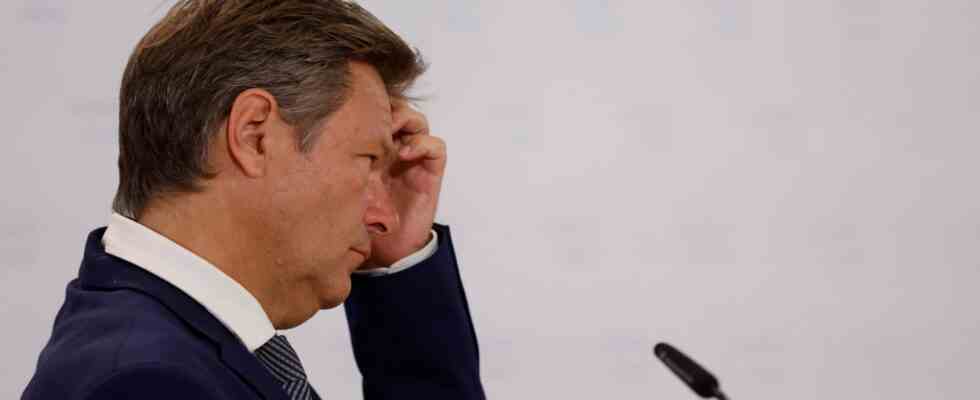Status: 07/12/2022 2:03 p.m
Economics Minister Habeck constantly warns of the consequences of a gas shortage. Private households are still protected by an emergency regulation – but the industry must also be protected from serious bottlenecks.
Federal Economics Minister Robert Habeck has questioned the prioritization of private households in the event of a gas shortage. Consumers would also have to “pay their share,” said Habeck during a visit to Vienna. A permanent or long-term interruption of industrial production would have massive consequences for the supply, said the Green politician.
“The European Emergency Gas Ordinance provides that critical infrastructure and consumers are protected and industry and business are not,” said Habeck. This makes sense for short-term and regional problems. “But that is not the scenario that we have at the moment,” he continued: “We may be talking about a months-long interruption in gas flows.”
Maintenance of the North Sea pipeline Nord Stream 1 fuels discussion about energy security
Kirsten Girschick, ARD Berlin, daily news at 2:00 p.m., July 12, 2022
Habeck does not want to forget industry in the event of bottlenecks
Habeck does not want to automatically put the industry at a disadvantage if there is a permanent shortage of gas. European guidelines don’t exactly fit the current situation and may need to be tightened up, he said. In the event of gas bottlenecks, private households and critical infrastructure such as hospitals should be supplied first. Industry and other companies would lose out.
The Economics Minister responded to a question about expectations of the EU strategy for energy security, which the EU Commission is to present next week. If a situation arises in which one country scales back its economic activity in order to provide warm homes in another country, “there has to be a certain amount of a solidarity mechanism for compensation,” he said.
Habeck: The gas crisis is a great opportunity for renewed strength
Habeck also sees a great opportunity in the current gas crisis. “There is now a new alliance of climate protection and energy security,” he said, referring to the intended accelerated expansion of renewable energies. Even if the current issue is the expansion of liquid gas terminals, there are structurally important developments. “There are powerful movements under the surface right now that, if we get through this, will make this continent, Austria and Germany strong and stronger,” said Habeck.
During the visit of the Austrian Economics Minister Martin Kocher, both countries committed themselves to close energy cooperation in a joint declaration. The two Austrian federal states of Tyrol and Vorarlberg are connected to the German gas network, while Austria has large gas storage facilities to offer.
Austria’s Energy Minister Leonore Gewessler warned that the Europeans should not – as intended by Russian President Vladimir Putin – allow themselves to be divided in view of the critical situation.
“Now time is of the essence”
Russia had recently significantly reduced gas deliveries to Germany and other European countries. Due to the maintenance of the Nord Stream 1 pipeline, the gas quantities are now even at zero. It is unclear whether deliveries will start again after the maintenance – and by how much.
Habeck spoke of dark clouds on the horizon. Scenarios had to be discussed that had been unimaginable for a long time. “Now time is of the essence.” The current crisis reminds him of the financial crisis of 2008, at least in one important respect. All warnings were ignored at the time, according to Habeck. “Of course there were voices, a one-sided dependency on a shady state leader, that can’t be right.”
The decision to build the Nord Stream 2 Baltic Sea pipeline was made in 2015, a year after Russia occupied Crimea. The countries would not have positioned themselves broadly enough, but would have gladly accepted the simple, cheap and financial advantage. Germany has made itself dependent, said Habeck, without naming Putin. He had repeatedly accused him of using gas as a political weapon.
Scholz relies on EU solidarity in the event of a gas shortage
In his own words, Chancellor Olaf Scholz is confident that the EU countries will show solidarity if there is a gas shortage in autumn or winter. “Of course we have to show solidarity in Europe,” he said after a meeting with Slovenian Prime Minister Robert Golob. “I am sure that we will succeed,” said Scholz.
Golob had previously emphasized that small EU countries like Slovenia could be dependent on the help. No country can deal with an energy crisis alone; There are only solutions in the EU network.
Kretschmann convenes gas summits
Meanwhile, Baden-Württemberg’s Prime Minister Winfried Kretschmann wants to take precautions for the impending crisis at a gas summit with municipalities, business and utilities in July. He announced this at a meeting of his cabinet in Brussels, as reported by the dpa news agency. At the meeting, concrete suggestions are to be collected as to where industry and households can save energy.
Kretschmann recently warned of the dramatic consequences of a gas shortage in winter for companies, employees and households. According to his own statements, he assumes that many companies that need gas for their production would then have to stop operations and lay off thousands of employees.
Habeck hopes for gas from Russia, FDP/Union are pushing for nuclear power
Jim-Bob Nikschas, ARD Berlin, July 12, 2022 2:53 p.m

